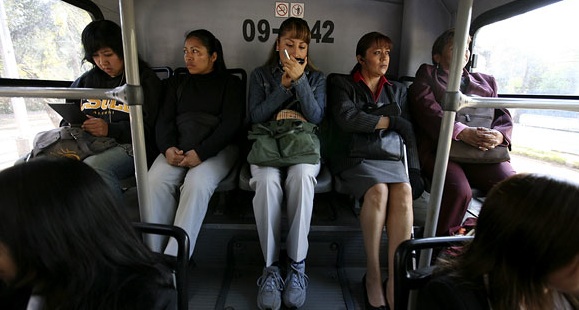
04/04/2017
Mexican men are widely known as being sexist swine, and they have a history of tormenting Mexican women on public transportation: the government reports that 65 percent of women in the capital city have been sexually harassed on buses or trains.The latest foray into civilizing the lecherous Mexican man is the installation of “penis seats” on the Mexico City Metro, which is supposed to send a message of awareness, or something.
Below, Mexico City commuters find the penis seat to be … odd.

The current social experiment is not the first. I reported in 2006 that the Mexican government produced TV spots showing sex dolls in the workplace to make the point that women are not sex objects (Sex dolls fight Mexican machismo, BBC). That media campaign seemed rather unclear in its message, to be kind.
My understanding of psychology is that edgy art presentations don’t change behavior, but immediate negative reinforcement does. Why couldn’t the Mexican government give women commuters free pepper spray and tasers? There’s nothing like associating an unwanted behavior with a swift pain: that sort of training works.
Women-only buses were gratefully received in Mexico when introduced in 2008, but there were only a few, and having a separate safe bus system for women is probably unworkable.

Unfortunately for America, Mexico is the largest contributor by far to our diverse gaggle of immigrants, particularly the illegal variety. Twelve million was the number of actual immigrants as of 2014, and that doesn’t count the many millions of cultural descendants.
The BBC reports that the new seat “sparks debate” but debate doesn’t normally change behavior, does it?
Mexico City metro’s ‘penis seat’ sparks debate, BBC News, MarchWhen a new style of seat suddenly appeared on Mexico City’s metro system, it was labelled as inappropriate, uncomfortable, humiliating and embarrassing.
It was supposed to be.
The seat, moulded to include a protruding penis and chest, was designed to highlight sexual harassment experienced by female passengers.
The explanation next to the men-only label read: “It is uncomfortable to sit here, but that is nothing compared to the sexual violence that women suffer on their daily journeys.”
The seat is not a permanent fixture, but part of a campaign launched by UN Women and the Mexico City authorities called #NoEsDeHombres, which aimed to highlight sexual harassment on public transport.
But the response has been mixed.
Underneath a video of the stunt, which has been seen more than 700,000 times in the past 10 days, some viewers praised the idea, while others called it “sexist” and unfair to men.
Gendes is a Mexican civil society organisation that focuses on working with men to promote equality and combat sexual harassment, which remains a major problem in the country.
Rene Lopez Perez, who heads their research programme, praised the campaign for taking an important issue and making it a talking point. But he also stressed the importance of not seeing all men as attackers.
“It’s important not to stigmatise all men as violent and potential attackers of women,” he said.
Holly Kearl, who founded the US-based website Stop Street Harassment, said there was something to be said for turning the focus away from women for once.
When she attended the UN Women Safe Cities Global Leaders’ Forum in Mexico City last month, she noted the onus of change was often put on women.
“Too often initiatives around women’s safety focus on what women should or should not do, so it is refreshing to see a creative campaign aimed at men,” she said.
The Mexican capital’s public transit system has long had a bad reputation for women’s safety.
In 2014, UK polling company YouGov conducted a survey about harassment on public transportation worldwide. For verbal and physical harassment, Mexico City’s metro was voted the worst.
Over the years, the city has tried various strategies to make women feel safer.
Trains have separate carriages for women. Women-only buses were also launched. An art collective, known as Las Hijas De Violencia (The Daughters of Violence), saw women responding to street harassment by blasting back at attackers with punk music and a confetti cannon.
Last year, the city’s mayor caused controversy by announcing another new strategy: women were to be offered a small, city-branded whistle that they could toot when they felt threatened.
The plan was largely derided for not getting to the root of the problem.
“If screaming doesn’t help, how will this?” wrote Mexico-based journalist Andrea Noel on Twitter.
Another Twitter user parodied the idea by suggesting the mayor’s office also created a set of maracas to shake when you come across a case of corruption.
Ninde, who does not want to be known by her full name, says she has no trust in the female-only carriages after she was assaulted in one last year when a man ejaculated over her.
She tries not to use the metro now, and will only do so if accompanied.
She would like to see more done to improve the service for women, but she does not think the “penis seats” help.
“It seems to ridicule sexual harassment. A real sexual assault is nothing like this,” she says. “I feel a little outraged that there are no real actions to eradicate the problem.”
This is a content archive of VDARE.com, which Letitia James forced off of the Internet using lawfare.